BLUE BEETLE (2023)
An alien scarab chooses a teenager to be its symbiotic host, bestowing him with a suit of armour capable of extraordinary powers...
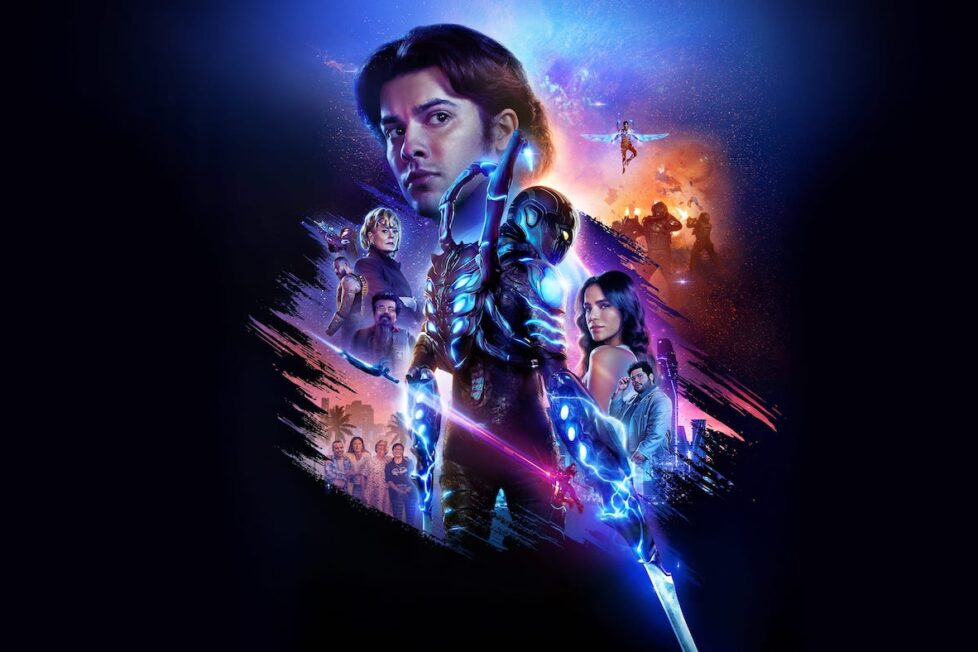
An alien scarab chooses a teenager to be its symbiotic host, bestowing him with a suit of armour capable of extraordinary powers...


Ángel Manuel Soto’s Blue Beetle arrives during an awkward pivot for DC Studios, as the era that began with Man of Steel (2013) is being washed away by new masterminds James Gunn and Peter Safran, and yet the Blue Beetle character was announced as being part of DC’s rebooted universe. So is this film going to remain canon going forward? It would be unfortunate if Blue Beetle became a victim of this transition phase, as it’s easily the best DC film in years; an old-fashioned, nicely-performed, well-written origin story.
There admittedly isn’t a lot about Blue Beetle that feels original in terms of its storyline and character types. It feels like the kind of superhero movie Hollywood was making 20 years ago, with an evil corporation after a MacGuffin our hero gets his hands on and must use to take them down while protecting his loved ones. The key difference is what also elevated Black Panther (2018), Shang-Chi and the Legend of the Ten Rings (2021), and Ms. Marvel (2022), in having the eponymous superhero come from a non-white background and lean into his cultural background and social differences.
Black Beetle’s Latino characters throw a lot of Mexican personality and cultural perspectives into the melting pot. This ensures the cut-and-paste feel to the plotting is softened by how engaging the cast is to watch, as it unexpectedly carries more of an ensemble feel—perhaps inspired by Robert Rodriguez’s similarly family-orientated Spy Kids (2001).
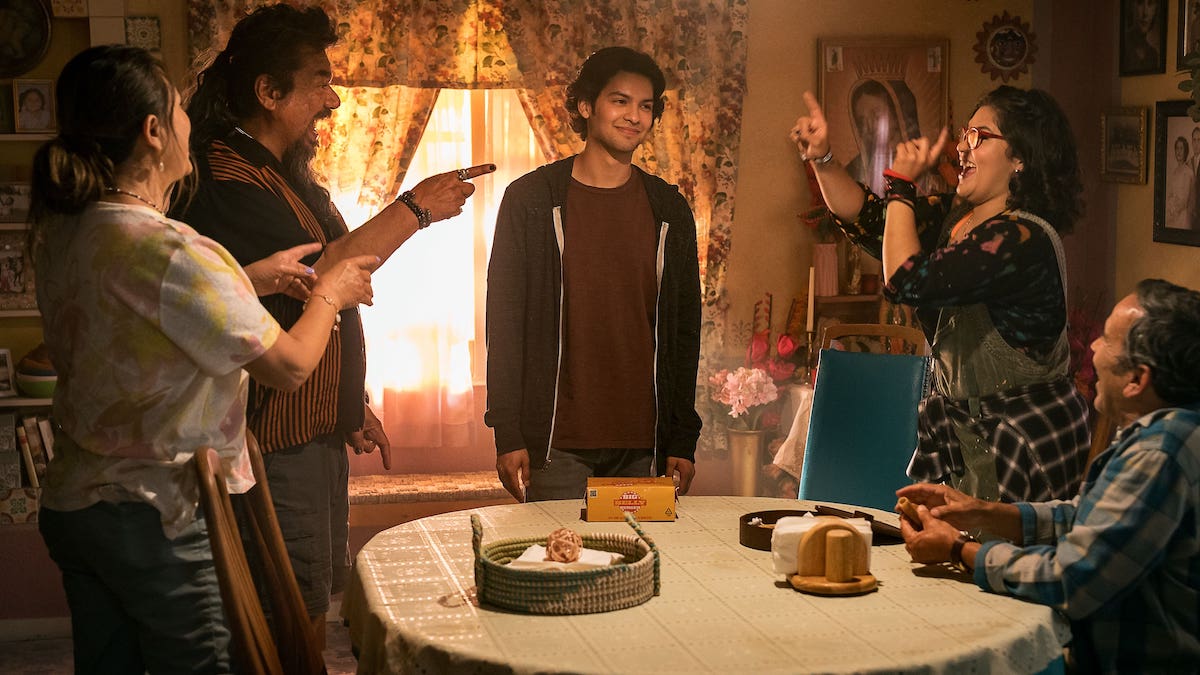
Jaime Reyes (Xolo Maridueña) is the first in his working-class family to graduate from college, but his dream of becoming a high-flier and moving them out of their impoverished district to the big city doesn’t go to plan. A few years later and he’s cleaning luxury pools with his sister Milagro (Belissa Escobedo), still living in the shadow of the gleaming skyscrapers of Palmera City.
To make matters worse, the Reyes’s are soon to be evicted and Jaime loses his job working for tech billionaire Victoria Kord (Susan Sarandon), although his life changes after he catches the eye of Victoria’s affable stepdaughter Jenny (Bruna Marquezine), who steals an alien “Scarab” device from her stepmother’s lab and smuggles it to Jaime before she gets caught. And once Jaime makes the mistake of handling the Scarab, it attaches itself to his body and transforms him into a superhero with a bullet-proof exoskeleton and powers akin to Iron Man and manga hero The Guyver (1991).
There have been so many cinematic superheroes that audiences are rarely served something that feels new. Blue Beetle is a relatively young comic-book hero, only debuting in 2006, but there isn’t much about him we haven’t seen before. He looks a bit like Deadpool wearing Spider-Man’s lethal “Iron Spider” suit, his abilities are similar to Iron Man’s (only with Green Lantern-style “will” creating various weapons), and the Scarab itself is revealed to be a conscious organism that leads to a more benevolent Venom (2018) situation for Jaime as he learns to live in harmony with his talking extra-terrestrial armour (voiced by singer Becky G).
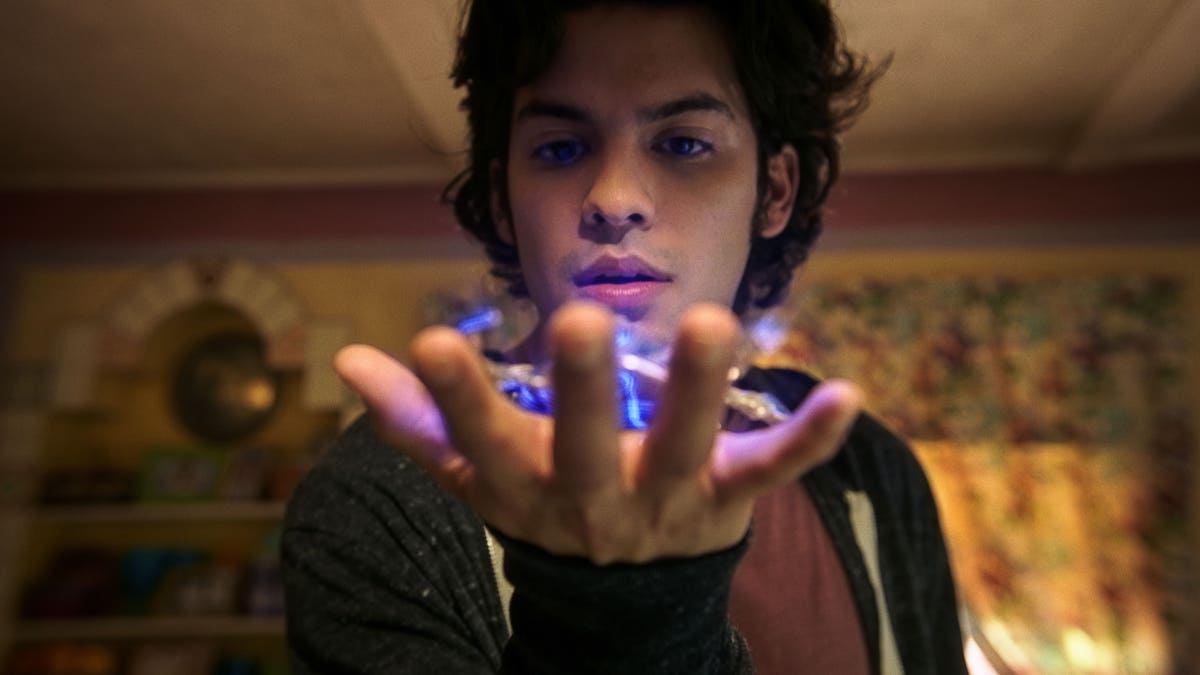
The saving grace of Blue Beetle is how it makes everything outside of the superhero stuff more interesting and entertaining than has become the norm. Screenwriter Gareth Dunnet-Alcocer makes a real effort to flesh out Jaime as a lovable character, but also in establishing the playful dynamic he has with his down-to-earth family — who are an eclectic bunch, maybe slightly tipping into parody at times, who provide the real engine to the movie. There’s Jaime’s noble father Alberto (Damián Alcázar), sweet mother Rocio (Elpidia Carrillo), quirky ex-revolutionary Nana (Adriana Barraza), his aforementioned cynical sister Milagro, and paranoid inventor uncle Rudy (George Lopez). The Reyes family strongly evoke the Cortez family from the Spy Kids franchise — especially once they all get to wield a variety of fun gadgets themselves —only with the sweeter vibes of the adopted family from Shazam! (2019).
There are also well-established themes about social inequality, the gentrification of lower-class communities, and the way foreigners (specifically Mexicans) are often overlooked and under-appreciated by Americans they’ve spent years integrated with. One of the best lines finds Milagro ruminating on their superpower being “invisibility” from the wealthy people they clean up for. Of course, the lowly Reyes family are shown to have healthier relationships than the imperialist Kords — as it’s inferred American CEO Victoria has merely inherited the company her late husband founded. And she’s now using it for nefarious purposes, like building high-tech mechanical suits based on the Scarab she found years ago.
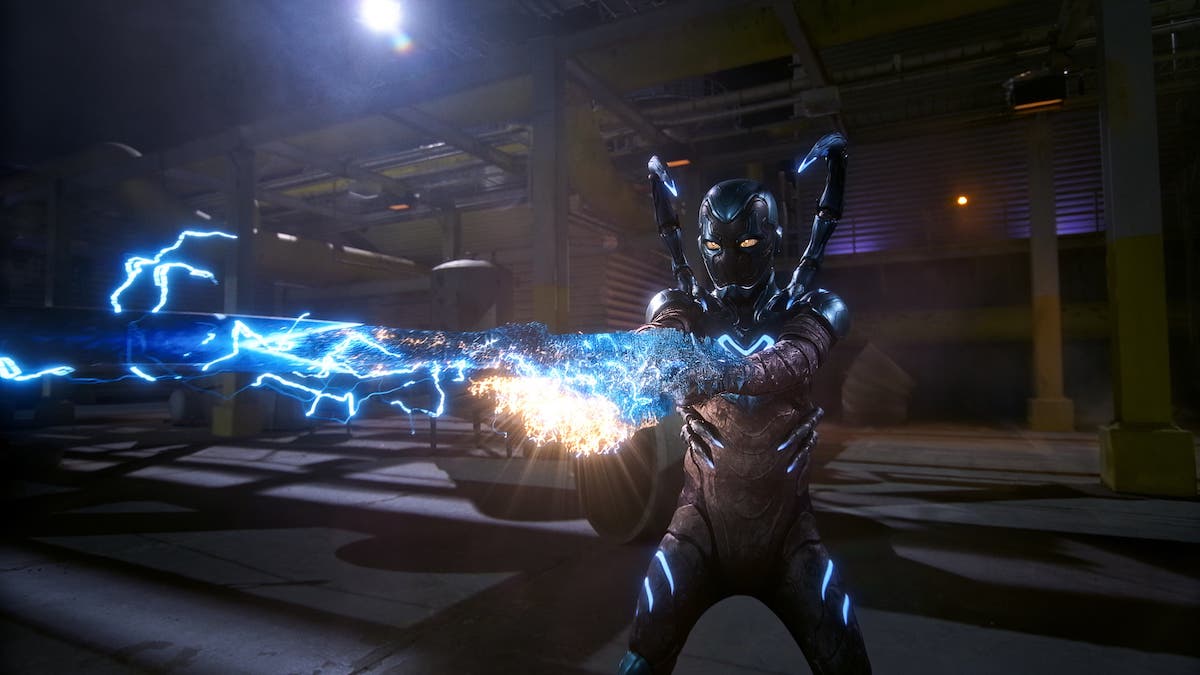
Overfamiliarity with the basic storyline and action sequences never sinks the film. We’ve seen many variations on Blue Beetle, so there’s not much of a thrill in seeing Jaime grapple with his new powers, but the fight sequences still pack a punch at times. This is perhaps down to the Second Unit Director, J.J Perry (Day Shift), who can be counted on to create violence with lively and exciting choreography. There’s a pleasing mix of practical and digital FX, too, which helps sell things that might otherwise have devolved into pure computer graphics.
Xolo Maridueña (Cobra Kai) makes an impressive jump to the big-time here, and it helps that his relatively bland nice guy character of Jaime Reyes isn’t the sole focus. There’s a lot on his shoulders, but the burden is shared by his aforementioned relatives and a love interest in Jenny Kord who works surprisingly because the two actors have chemistry. I also enjoyed sidekick villain Ignacio Carapax (Raoul Max Trujillo), who becomes the main physical opponent of Blue Beetle, not least because the writing finds a decent way to make him into a more three-dimensional bad guy along the way.
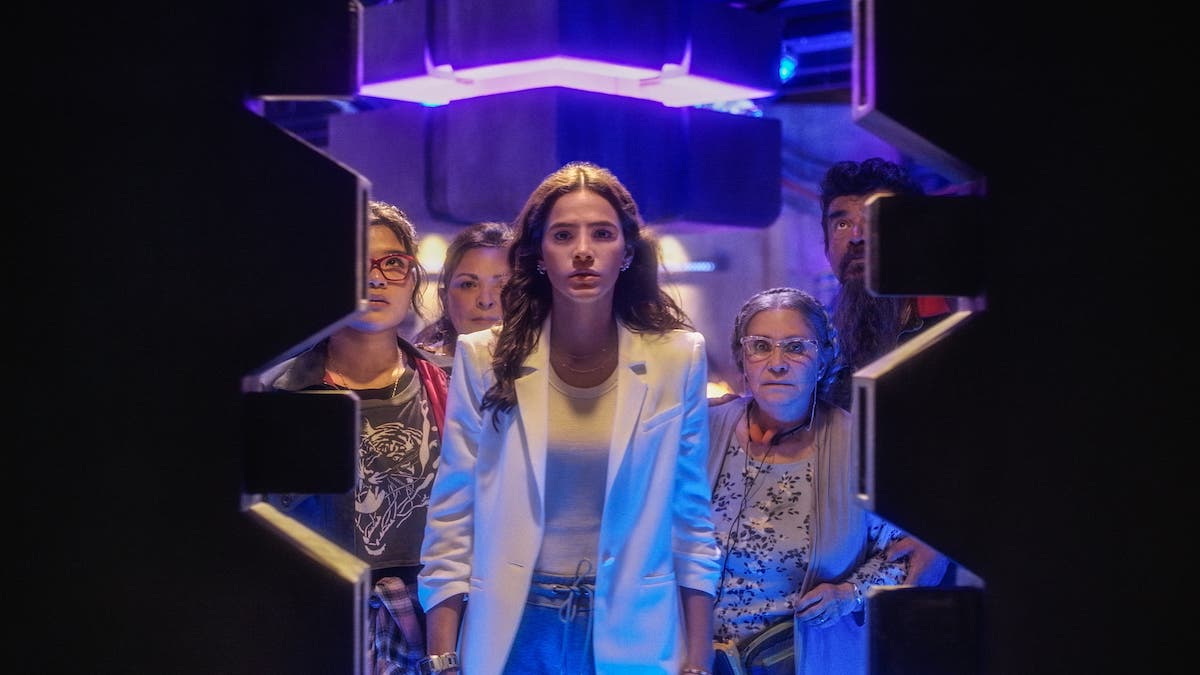
It also helps that Blue Beetle is an unknown comic-book series for the average filmgoer, so while there are similarities to his design and skill-set we’re not aware of his lore. A development about the Kord family’s legacy halfway through therefore comes as a nice surprise, spinning the story off in a cool new direction, and the story ends with plenty of avenues left to explore. We know precious little about who built the Scarab and how it came to be on Earth, for example, so a sequel has loose-end mysteries left to explore.
If there’s one unfortunate downside, it’s that Susan Sarandon is lumbered with a generic villain who doesn’t rise above some hackneyed writing. She’s a literal “evil stepmother” and cutthroat CEO, going through the motions as the most famous name on the poster dealing with the least interesting material. It would have helped the film enormously if Victoria Kord had been more frightening or unique, rather than a stereotypical uncaring boss with vast wealth at her disposal. There are a few hints at something interesting in her twisted relationship with Carapax (a man we learn she raised as a boy to become a loyal and obedient “weapon” for her), but not enough to salvage things.
Blue Beetle benefits from not requiring prior knowledge about anything related to the comics or DC, and it avoids linking itself to any other films (beyond a few mentions of Batman and Superman). If this had come out a decade ago, it would have been hailed as DC’s version of Iron Man (2008) for how it successfully brings a little-known superhero to wider attention in a fun way. As it stands, Blue Beetle’s either an eleventh-hour victory for DC that could mean nothing because this universe is about to be reset, or an aberration that DC may somehow fold into whatever comes next. It feels separate enough to work into the new connected universe Gunn and Safran have planned, so I hope to see more.
MEXICO • USA | 2023 | 127 MINUTES | 2.39:1 | COLOUR | ENGLISH

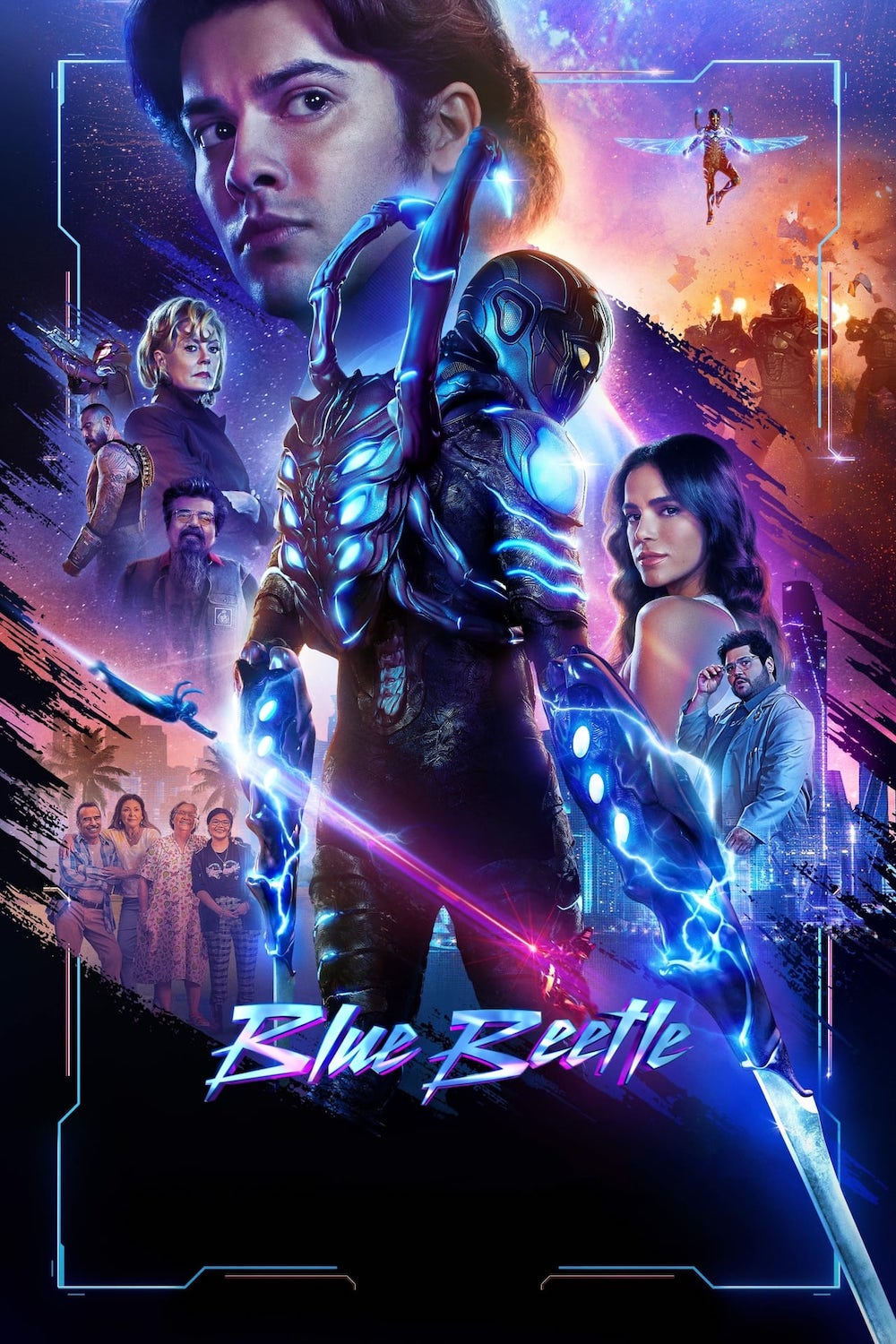
director: Ángel Manuel Soto.
writer: Gareth Dunnet-Alcocer (based on characters from DC).
starring: Xolo Maridueña, Adriana Barraza, Damián Alcázar, Raoul Max Trujillo, Susan Sarandon & George Lopez.
